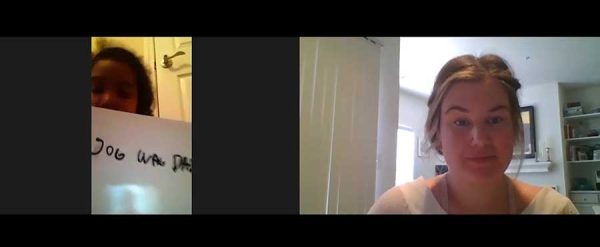Summer reading camp goes virtual

For the past four years, the UNC Charlotte Summer Reading Camp welcomed elementary students from Charlotte Mecklenburg Schools (CMS), providing daily, one-on-one literacy support for rising second and third graders who struggle with reading.
Students in this category are considered to be even more vulnerable this summer because school as they were accustomed to shifted for the academic year’s final three months. Just as life changed for schools with the arrival of COVID-19, it did as well for camp organizers from the Cato College of Education as to how they planned and delivered the valuable instruction.
This summer, the camp moved from the quiet study rooms on the campus of the Aldersgate retirement community to an online format, presenting a number of initial challenges.
First among them, making sure teachers were properly trained to apply the specialized technology and provide instructional materials to the students. The 30-minute sessions were held five days a week.
“Students and teachers connected using Zoom, the online platform many had used for instruction since March when the schools closed,” said Kristen Beach, associate professor from the Department of Special Education and Child Development. “Familiarity mitigated a learning curve and allowed the kids to hit the ground running when camp started.”
Program leaders videotaped the instructional meetings, and it was readily apparent the young students were enjoying the experience and making tangible progress on their reading skills.
Watch as some students interact with their mentors:
Relationships with CMS, Aldersgate and HELPS Education Fund provided reading instruction at no cost to 44 students from two low-income schools, Windsor Park and Oakhurst Steam Academy, where about 90 percent of the student population is enrolled in the federal school lunch program.
The materials provided included 25 books, headsets, microphones and other educational tools to each participating student.
This year, Aldersgate residents donated bags of nonperishable food items for families to pick up and add to their home pantries. In the past, the residents were able to mentor students.
To qualify for the four-week camp, students’ reading levels had to have been below grade level prior to the early school closures.
“Researchers estimate that students whose schools closed may begin the next school year having retained only 70 percent of what they learned the previous year,” Beach said.
Chelsea Howard, a fourth grade teacher at Windsor Park who just completed her third camp, said the sessions were enjoyable and productive for both the students and the mentors.
“I was able to have one-on-one sessions with each of my students, which led to strong relationships with each learner,” she said. “They enjoyed writing on the whiteboard, reading books with their teacher and playing word games.”
The parent of a rising second-grader from Oakhurst said her child gained a lot of confidence from participating in the summer reading camp.
“My child’s teacher made a big effort to help my child. There were times when I couldn’t get on Zoom and she took the time and effort to actually double up sessions in a day,” she said. “She tried to accommodate and work with me and (my child) so that my child could get everything she needed.”
It is possible that without camp, many of the students wouldn’t have picked up a book between March and August, said Beach.
“Reading at grade level by third grade is critical because reading skills at that age predict a student’s success in high school and beyond,” said Beach, who also directs the camp and leads the analysis of the program.
She reported that data compiled from 2016 and 2017, well before the pandemic, indicates that the literacy program prevented the summer regression in reading skills that is particularly common in low-income communities.
Howard said the program keeps students reading and practicing their skills in a fun way.
“I love working with the Summer Reading Camp because it helps me build bonds with students from my school that may not be in my classroom during the school year,” she said.
Another mentor, Lisa Koch, a third grade literacy teacher at Merry Oaks International Academy, came away from the camp feeling that she and her peers moved the needle for the students.
“One student got a 78 percent on a mastery test at the beginning of the summer and then passed with a 100 percent by the end,” she said. “After successfully getting through 25 lessons in the few weeks together, his confidence in reading definitely improved.
“I know that these skills are the stepping stones to success for him this coming school year.”